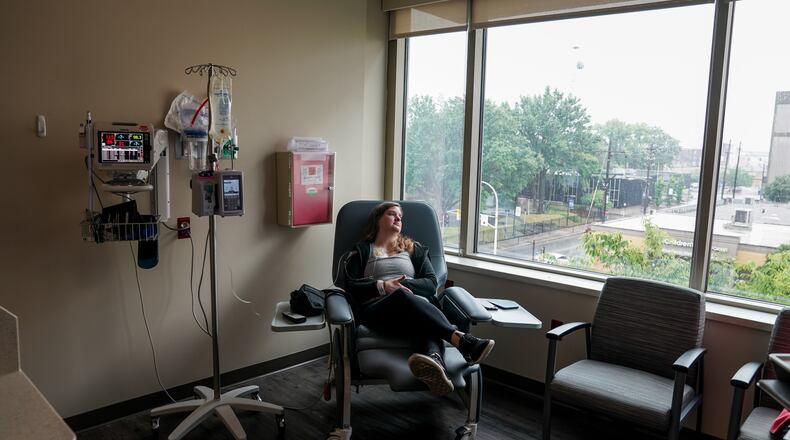Emory University and Morehouse School of Medicine are finalists for large grants to tackle major challenges in the fight against cancer: stark racial disparities in cancer care and outcomes, and why cancer is striking more young adults, including those with no obvious risk factors.
The “Cancer Grand Challenges” grants are offered by the two largest funders of cancer research in the world – Cancer Research UK and the National Cancer Institute in the United States. Each winning team could get up to $25 million.
Research teams from Emory and Morehouse School of Medicine are among 12 finalists, narrowed down from about 300 submissions from around the globe. Winners will be announced in March.
“We know 30% to 50% of cancers could be prevented by avoiding risk factors and implementing evidence-based strategies,” said Dr. Valerie Montgomery Rice, president of Morehouse School of Medicine. “But there are still unknown risk factors and understudied populations and many cancers will have a cure if diagnosed early and treated appropriately.”
Research teams from each school submitted a proposal for a study that would address one of nine cancer challenges posed by the National Cancer Institute, which is part of the National Institutes of Health, and Cancer Research UK, a non-profit organization and world’s largest independent funder of cancer research.
Here’s a look at each of the local teams, the challenge, and how they plan to better understand and find solutions for big questions in cancer.
Challenge category: Early-onset cancers
Team Lead: Dean Jones of Emory University
The challenge: Some cancer types including colon, breast, and bone marrow cancers, have been rising in people under 50 in multiple countries. This trend cannot be explained only by an increase in screening. The challenge aims to identify and understand how biological and environmental factors may cause early-onset cancers. The findings could help identify cancer-fighting strategies.
Colon cancer, which was once a more distant cause of cancer death in both men and women, is now a leading cause of cancer death for men and women under 50, according to the American Cancer Society’s annual report released last month. It ranks first for men under 50, and second for women under 50.
It’s unclear why cancer is rising among younger people, but possible reasons include obesity and lifestyle factors such as alcohol consumption, poor sleep, stress, and being sedentary. Environmental factors including exposure to pollutants and carcinogenic chemicals also likely play a role.
Because much of what is known about cancer risk factors is based on studies of older adults, Emory is proposing a study looking at how exposures and risk factors early in life – as early as during the prenatal period — could lead to cancer. Emory’s proposed study includes analyzing data from 20,000 pregnancies.
The study would include eight institutions in Canada, the Netherlands, Israel, Mexico, and the United States.
Challenge category: Cancer inequities
Team Lead: Melissa Davis of Morehouse School of Medicine. She is the head of the recently established Institute of Genomic Medicine at Morehouse School of Medicine.
The Challenge: Stark racial health inequities in the prevention, early detection, and treatment of cancer are resulting in differences in cancer incidence and mortality.
Black people are diagnosed with and die from cancer at higher rates than other races, according to the Centers for Disease Control and Prevention.
For example, although deaths from prostate cancer have dropped substantially in recent decades among all men, Black men are twice as likely as white men to die of prostate cancer and have the highest prostate cancer mortality among all U.S. population groups. Black people are also more likely than white people to be diagnosed with breast, lung, pancreatic, and colorectal cancers at a late stage, making it harder to treat.
The “cancer inequities” challenge is aimed at better understanding the interplay among many factors in cancer risks and outcomes, including social determinants of health, behavior, biology, and genetics.
Most inequities are strongly influenced by social determinants and circumstances, so people who do not have reliable access to health care are also more likely to be diagnosed with late-stage cancer. But data also suggests that genetics and biology play a role.
Credit: KreativTouch.com
Credit: KreativTouch.com
“To deconvolute, whether or not it’s the environment, if it’s genetics, if it’s a social experience and stress,” said Davis, “and I think the answer to the question is it’s all of those things to different degrees...”
Morehouse proposes to lead a team of researchers from 14 institutions in multiple countries including Ghana, South Africa, the United States, and the United Kingdom, who would focus on breast, prostate, and pancreatic cancer in people of African descent.
Prior research to address cancer inequities has been skewed by huge diversity gaps. Most of the work that has informed understanding of what causes cancer has been done in people of European ancestry. Black people make up 13.4% of the U.S. population but account for only about 5% of clinical trial participants, according to the Association of American Medical Colleges.
Davis said she is nervous and excited waiting for the final decisions.
“I try not to lose sleep but it could really change the world if we get it,” she said.
About the Author
Keep Reading
The Latest
Featured



